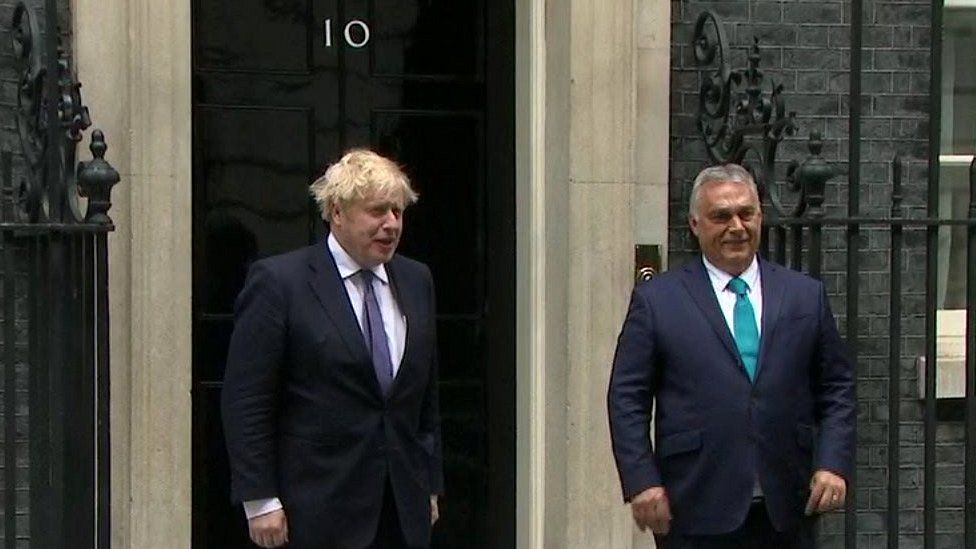Viktor Orban in talks with Boris Johnson amid condemnation
- Published

Boris Johnson has welcomed his Hungarian counterpart, Viktor Orban, to Downing Street, amid widespread condemnation of the visit.
Critics have accused Mr Orban of anti-semitism and Islamophobia after he spoke previously of "Muslim invaders" and described migrants as "a poison".
Ministers say it is "absolutely right" to build relations after Brexit.
But Labour says the meeting undermines values the UK government says it wants to defend.
On Thursday, Downing Street criticised Mr Orban's comments as "divisive and wrong" but defended the visit as "vital" for the UK's security and prosperity.
It said Mr Johnson would "not shy away" from raising human rights concerns.
And speaking to Sky News ahead of Mr Orban's arrival, Business Secretary Kwasi Kwarteng said the meeting was "completely reasonable".
Mr Kwarteng said leaders "have to speak to all sorts of people, all sorts of leaders across the world whose values we don't necessarily share."
"I think Viktor Orban's views on migrants are things that I would not endorse in any way. Having said that, I think that we have to engage with the EU, he's an EU leader," he added.
"And in this post-Brexit world" he said, "It's absolutely right for us to be building bilateral relations with countries."
Viktor Orban's visit to Downing Street has prompted much scratching of heads.
Why on earth would Boris Johnson decide that he should be the second EU leader since Brexit to get a warm welcome at Downing Street?
There are several reasons.
The first, I am told, is that the Hungarian leader asked for the visit. It's been in the diary for a couple of months. And as one No10 source said, you have to have a pretty good reason to say no to an EU head of government if they ask to see you.
Second, Mr Orban is also taking over the presidency of a group of central European countries known as the Visegrad 4.
There are regional issues to discuss and EU issues to discuss. Mr Johnson will be seeing several of the big EU players at the G7 summit next month; this was a chance to touch base with a smaller EU country.
And third, so the argument goes, the UK can't just talk to countries it agrees with.
Mr Orban is close to Russia, China and Belarus and this meeting - in theory - gives the Prime Minister the chance to have what one official described as "the difficult conversations" about those countries.
But there is also a suspicion at Westminster that Downing Street said yes to this visit without realising the impact it would have, viewing it as just another regular bilateral meeting. "Number Ten has walked into a bear trap," said one Whitehall source.
To some in Europe, the visit will be seen as provocative and divisive.
I am told this was not the intention but that won't stop some seeing it as such.
The bigger problem is that this visit sits uneasily with one of the government's big agendas for its G7 presidency.
The UK wants the G7 and its allies to do more to defend western liberal democracy and its values.
Mr Orban is seen by many as the antithesis of that.
Labour says Mr Orban is one of Europe's "most regressive" leaders and when the two prime ministers meet, Mr Johnson needs to challenge his "repeated attempts to undermine democratic values".
Shadow foreign secretary, Lisa Nandy, said Mr Johnson should urge Mr Orban to take "a robust stance towards the Lukashenko regime in Belarus and Putin's Russia".
And responding on Twitter to Downing Street's condemnation of Mr Orban's comments, she said Number 10 was "now rowing back on the decision to roll out the red carpet".
"Turns out when you have no moral anchor, you end up adrift" she added.
Liberal Democrat leader Sir Ed Davey has written to Mr Johnson saying he is "extremely concerned" about the visit and has outline 10 challenges the Prime Minister should put to Mr Orban during their discussions.
"Orban's rule has been marked by a sustained assault on Hungarian democracy, on press freedom and on human rights" Sir Ed said.
Mr Orban, a Eurosceptic, has previously praised Mr Johnson for delivering Brexit.
He is a close ally of Russian President Vladimir Putin, and has twice blocked the EU from issuing statements condemning China for actions in Hong Kong.
Last year, he pushed the EU to lift sanctions on Belarus, where a Ryanair flight was diverted last week so authorities could arrest a prominent journalist who has been critical of the regime.
In 2018, in an interview with a German newspaper, Mr Orban described refugees as "Muslim invaders".
Two years before that, in an joint press conference with the Austrian Chancellor, he spoke of migrants as "poison".
Mr Johnson's official spokesman said the meeting would "promote UK interests in these areas and discuss issues in the wider region".
The spokesman added: "On all human rights issues we do not shy away from raising them, the PM has condemned those specific comments which were divisive and wrong".
Related Topics
- Published30 March 2020
- Published26 June 2018
- Published3 March 2021